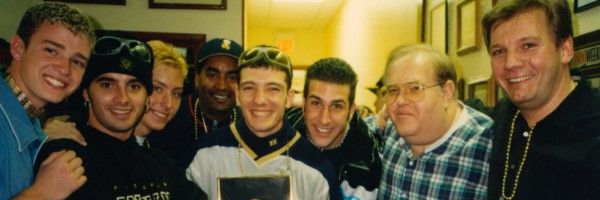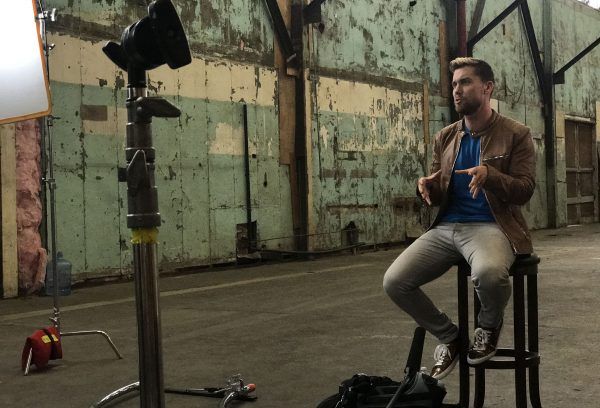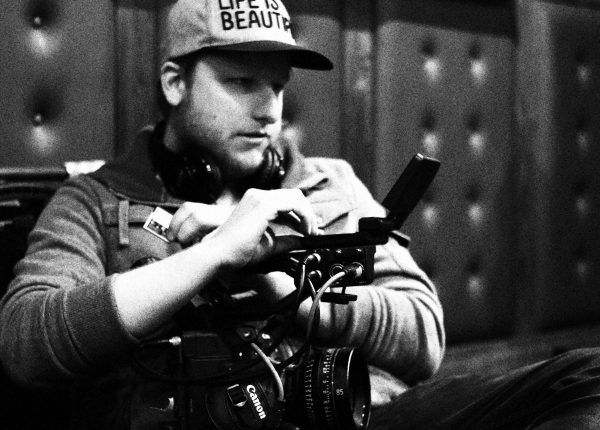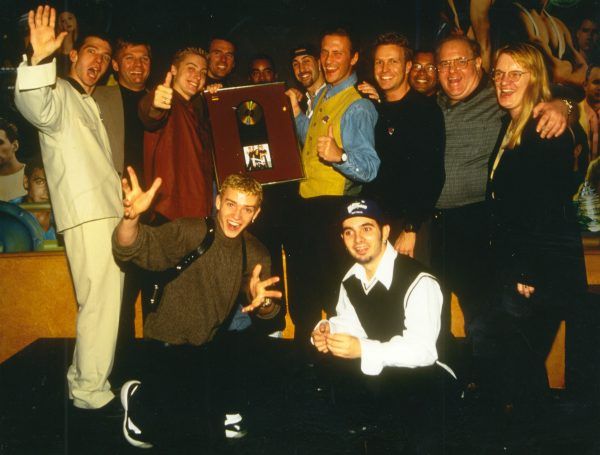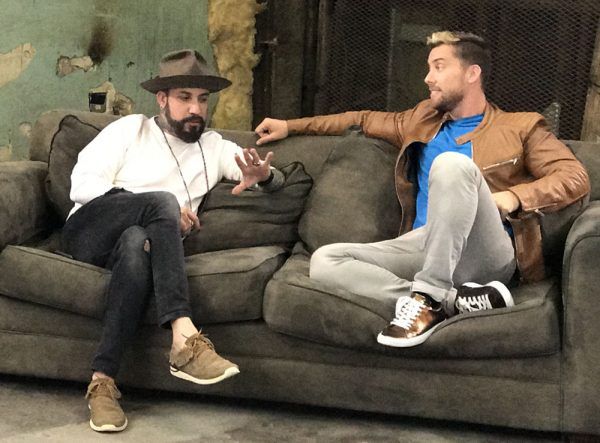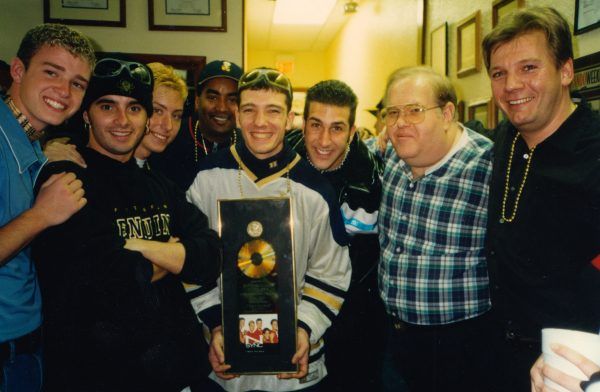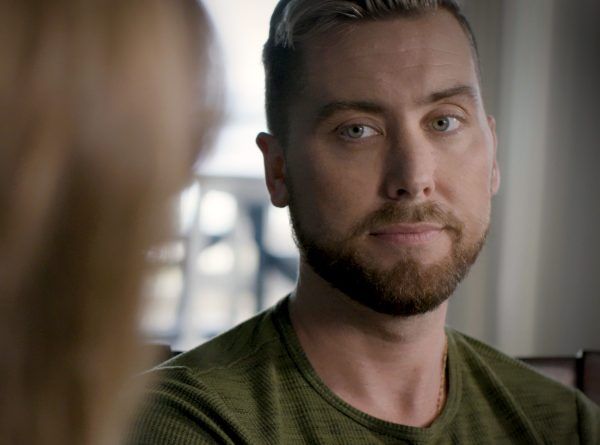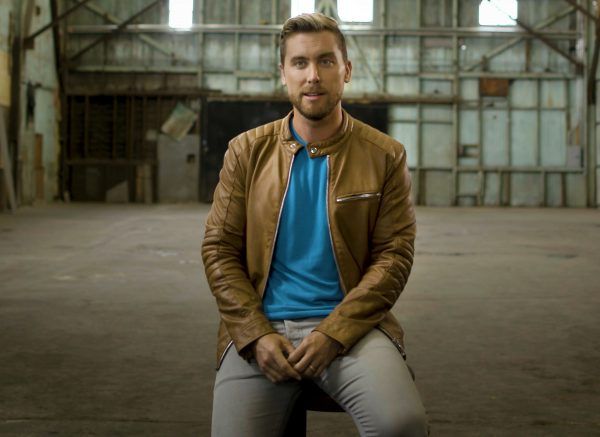From director Aaron Kunkel and producer Lance Bass, the documentary The Boy Band Con: The Lou Pearlman Story (available to stream at YouTube) charts the life and crimes of the man who turned talented young singers into superstar boy bands, like *NSYNC and the Backstreet Boys, and created rivalries between them while stealing their money, only to then go on to perpetrate one of the largest Ponzi schemes in American history. The unbelievable story is told from the perspective of Lou Pearlman's childhood friends, the Ponzi scheme investors, and the boy band members themselves, while tracking his life from his childhood in Queens, New York until he ultimately had to answer for his crimes.
During this phone interview with Collider, former *NSYNC member Lance Bass and filmmaker Aaron Kunkel talked about what made now the right time to finally tell this story, why they weren’t looking to make a Lou Pearlman hit piece, why it took so long for the bands to realize what was going on, lining up the film’s interview subjects, showing the human side of the emotions that all of this brought out, the experience of being right in the middle of the boy band craze, whether they believe Lou Pearlman felt bad about any of what he did, getting to a place of forgiveness, and what they’d like to do next.
Collider: I knew about some bits of this story, but I did not know all of the details of everything that was going on. What made now the right time to finally tell this story?
LANCE BASS: Right now, we’re in a time where people are speaking their truths. There’s a platform for victims to actually talk about what they went through, and people are actually listening and believing them. When we started doing this, I didn’t know half of the things that Lou [Pearlman] was involved with, and all of the scams that he enacted. I was just floored by a lot of things that I learned, as we were doing this. Ultimately, it’s a cautionary tale that’s so key to listen to, especially if you’re going into the entertainment industry, as a young person or a family member of a young person. It gives you a nice warning of what to look out for, and you can use all of that information for really anything you’re doing in life. We also found that it was really topical, in this day and age, just because there’s so much in this story about truth and lies, fact and fiction, and everything blended together, with fake news, and all of that. It just seemed like the right time to tell the story about what makes you believe a con-man, and what makes you believe someone when their lying to you or twisting the truth.
Lance, obviously you don’t want something like this to happen to yourself or anybody else, but do you feel some sense of comradery with all of the other people who also fell for what was going on?
BASS: You do feel like a family. It’s really nice to know that there are people that support you because they know what you are going through, and then doing this and connecting with a lot of these victims of Lou Pearlman. You realize that there is a family out there for all of us, and it’s very cathartic to talk it all out.
Aaron, how did you get involved with this? What led you to be the director on this, as well as a D.P. and editor?
AARON KUNKEL: A lot of other great people. Actually, our producer, that I worked with at Pilgrim Media Group, Matthew Ducey, had always been fascinated by this story, since he was young. He pitched it to me, and I thought it was really fascinating, too. What clinched it was when it first started to land, he had seen that story told in so many ways, and not with the people who were actually there. A lot of times, it was a lot of over-aggrandizing things, or rumor-mongering, or over-salaciousness, and that wasn’t their experience. So, it was really inspiring to tell the story from those who actually lived it, and who could tell the real story. I was fortunate enough to be able to direct it, and then shoot it with Henry [Darrow McComas], who was the D.P. with me, and edit it with Shane [Patterson], who edited with me. It was a great team, all around, that got this done. No movie is made in a vacuum, by a single person. I was lucky enough to have a great team, from Lance [Bass], who was a great producing partner, all the way down to A.D.s who would not clock in, just because they wanted to make this a great story.
As a filmmaker, you want to be as involved as you can with your projects, but does that also present its own set of challenges, when you are trying to wear so many hats at once?
KUNKEL: It does, and it doesn’t. It definitely helps in the editing room because I was there for everything and I knew all of it. That’s why it was great to have a good team around me because they could stop me and be like, “Aaron, you’re holding onto your baby, a little bit. That stuff doesn’t need to be there. We need to streamline this.” I think my first cut was two hours and 45 minutes, and they were like, “Man, that’s way too much.” That’s why it’s great to have someone like Shane in the editing room, and Lance really helping hone the story down to exactly what it needed to be, and then we stripped out the things that we didn’t need.
Lance, when you decided to do this, what did you go into it hoping to get out of it, and do you ultimately feel like that’s what you did get out of doing this?
BASS: Well, going into it, I knew that I didn’t wanna make this a hit piece on Lou Pearlman, and make it as salacious as possible, with the things you could read in Vanity Fair or American Greed. I wanted to show a full story that was very layered because Lou was a very complicated guy, and from the earliest that we could find out information about him – from 10 years old to his death – I wanted to cover it all and I wanted to use people that were there, firsthand, to give them a voice. We had a lot of push back from that because everyone wants the more dramatic film. What we ended up with was just a very honest telling of his life. What I’m very excited about is that, at the end of the film, you feel as conflicted as all of us do, as far as how you’re actually supposed to feel about Lou. As horrible as he was, as a businessman and scam artist, you still have this empathy for him, for some odd reason, and we wanted to tackle that.
One of the craziest things about Lou Pearlman is that he talked big, but he also came through. He had this eye for talent, and he turned kids into superstars, so all of this could have gone very differently if he’d actually just been honest and upfront with people.
BASS: I know. Lou Pearlman could’ve had the new Motown there, in O-Town. That’s what I was so excited about, when we joined Trans Continental Records. I knew the vision of Trans Continental Records was trying to be the new Motown. So, I was excited to work with all of these new groups and collaborations, and feel like a family, but it didn’t end up that way. He didn’t want any of his groups talking ‘cause, ultimately, we would find out how screwed we were all getting.
When did you realize that he really was creating his own rivalry among his own groups and that he was actually playing you guys against each other?
BASS: I don’t know when we realized that was a ploy of his. Honestly, ‘cause he was such a good scam artist, we believed everything he said. We believed that the Backstreet Boys hated us. It was, “Make sure you don’t ever talk to them, if you're in the same room, ‘cause they have so much hatred for you.” So, we were scared to even bring up anything in front of any of the bands ‘cause we didn’t wanna get yelled at. Also, we were so busy. They kept us working, every day, as long as we were *NSYNC. We didn’t have time to sleep, so we didn’t have time to figure out that our business deals were horrible.
How did you guys work out who would actually be appearing and talking in this? Did you make offers to everybody to participate, and this was just who was interested and available and wanted to talk, or were there specific people that you knew you wanted to get involved with the film?
BASS: The hardest part was definitely casting this thing. My ultimate goal was to get a couple of people from all of the bands that he was apart of, and then get several of his Ponzi scheme victims, several of his childhood friends, and two of the mothers. I just wanted to get every angle possible covered. We ended up having three *NSYNC-ers, which was great. And then, with the Backstreet Boys, they decided that AJ [McLean] would tell the best story. The rest of them were afraid to be in it. Crazy enough, after the first cut of the film, we started showing it to a few people and it changed a lot of people’s mind. They realized that the tone we were going for was not a hit piece, so then we had a lot of people fighting to be in it.
Aaron, as you have all of these people and this material, and you’re telling this story, did you know how you wanted to shape it, from the beginning or did seeing and hearing what people had to say help you figure out the best way to present this, as a film?
KUNKEL: It was a little bit of both, actually. We’d always thought about the structure, from the beginning, because we knew that the bands were everybody’s into this story. It was always gonna be a bit more to draw you in, to start by telling the bands’ story, and then switch over, as opposed to starting the film with Lou Pearlman born in the 1960s in Queens, New York. We also wanted to structure it a little bit like a con, to be honest. We wanted to show you what these bands went through, and the pomp and circumstance, and the fun that they had, so that you could feel, hopefully, the same thing that they felt when the bomb got dropped on them and everything fell apart from there. So, the whole time, we were trying to be really cognizant of providing at least an emotional throughline of what the people who were there were feeling, at the time. Even the financial victims were really excited about everything Lou was offering, at first. We wanted to make sure that we showed that whole storyline, piece by piece, and let the dominoes fall apart, as they actually fell apart in real life. Hopefully, that came through.
As a filmmaker, you’re dealing with performers that are used to being on camera and telling their stories, and then you’re also dealing with everyday people who are likely not used to that kind of thing. Did you deal with people differently, depending on who you were filming, at the time?
KUNKEL: Honestly, it all came down to was developing a relationship. Especially when you’re making a doc about a time in a lot of people’s lives that, in a lot of ways, was a rough time for a lot of these people, it all comes down to whether they trust you, and whether they trust that you’ll tell their story, and not change it or re-edit it, or anything like that. They just want you to be honest about what they were feeling in the story. Deep down, these are huge superstars that we’re working with, but they’re still real people with real feelings, and a lot of the time, it was hard for them to look back on that time and really reflect on what was happening. Ultimately, it just came down to developing a relationship. When it came to a lot of people from the band, a huge help in all of that was Lance. Lance is a genuinely kind and good person, and everybody knows that, so that brought a level of trust to everyone, that this was gonna be done the right way.
Lance, I really loved the conversations between you and your mother, who just is so genuine and sweet. Did you always know that you wanted her involved, or did you need some convincing to get your mother involved?
BASS: I’ve thrown my mom into a lot on projects, especially when it talks about the *NSYNC days. She’s so shy. She does not like attention, at all. So, it’s a lot of anxiety, when I put her through things like this, but she loves me and she does it for me. In the end, she’s just so lovable. People absolutely love watching her, when she does a project with me, and it’s an angle that I knew I had to have. At the beginning, it was Lynn (Justin Timberlake’s mother) and my mom who managed us, when we moved to Germany, and it shows you that even the adults in the room were completely had by this guy. Even adults couldn’t see the scams.
KUNKEL: These are some of the biggest pop stars in music history, but that doesn’t mean they also don’t have a really loving and sweet relationship with their mothers. It’s so cool to have them look through these photo albums, and it’s Lance flying above the crowd at a concert, but it was taken on the same point-and-shoot camera that all of our moms had, back in the’90s. It really shows that intimate side that, deep down, these are all people, just like the rest of us and with the same emotions. We wanted to show folks that intimate side, as well as the big pop music side.
Lance, when you guys were right inside of that boy band craze and all of that was going on around you, what did it feel like? In those moments, what did you think your musical future was going to be?
BASS: You know, as long as we were with the group, it all seemed the same to us. We never had time to listen to the radio, watch TV, or read magazines. From the moment we all lived together, we were rehearsing every day and doing shows, and it just never stopped. We didn’t realize how big it had gotten, until after we stopped making music. Now, looking back, we’re like, “Oh, my gosh, we did a lot of things.” But when you’re in it, it’s just such a bubble that you have no idea what’s going on, in the outside world.
What would you say your own best memories of having been a part of *NSYNC are, and how do you feel your fame through *NSYNC has really affected your life, in positive ways, today?
BASS: Oh, man, I’m so lucky to be able to be able to experience that because it led to some really great things that I wanted to do in my life, in this entertainment industry. I’m getting to produce films that I have passion about. Some of my favorite moments were the early days of *NSYNC. That grind you always hear about, doing all of those club shows and just never sleeping, was just a really fun time for us. We were working so hard and we were so young that we felt like everything that was coming to us, we deserved, at that moment, because we were just working so hard. We were just happy that it was all paying off, at some point.
Because you both really unraveled this story and learned about things that you didn’t know going into it, do you feel like Lou Pearlman actually felt bad about any of what he did, or that he had an awareness of what he was doing to people?
BASS: In the end, I don’t know if he felt bad, at all. I think he knew exactly what he was doing, but I also think he was such a narcissist that he believed every lie that he told. Until his dying day, I think he thought the world owed him everything, so we were never gonna get any remorse, and we were never gonna get an apology.
KUNKEL: Alan [Gross], Lou’s childhood friend, was one of the last people to talk to Lou, through his phone calls with him in prison, and his thought was that Lou never really understood how much of a criminal he had become. Whether that was from lying to himself and believe it, or what, it seems like he didn’t quite understand. And he was still trying to create more boy bands and get things going while he was in prison. He just didn’t stop until he passed away. He never stopped.
Lance, you’ve previously talked about forgiving Lou Pearlman for what he did. How were you finally able to get to that place?
BASS: This doc definitely helped. I put him out of my mind, for many years, because it’s something that you just don’t want to relive, over and over again. Doing this was very cathartic because I do feel like it’s some closure. I feel like it’s the period at the end of this chapter, and I can really move on. It really helped me feel at peace with him, and have forgiveness.
Did this experience change how you’ve looked at and dealt with people since all of this, or have you been able to compartmentalize this as an isolated experience with one individual?
BASS: I’ve learned so many lessons from this experience, and I carry it with me, in every part of the entertainment industry that I’m a part of. I just wanna be as fair as possible, and every single deal that do, I just want it to be known as fair. I got that from what we went through with Lou. I just wanna do the right thing.
For both of you guys, do you know what you’re going to do next? Do you know where you’d like to take your career next?
KUNKEL: We’ve talked a lot about wanting to keep working together. It would definitely be an honor to keep getting to make movies with Lance. We’re developing a few things, especially in the world of the environment. We’re both really into that and are hoping to inspire people that the planet’s something worth saving and is something that we should save. I would love for the world to just keep letting me make movies. That would be a dream come true.
BASS: My passion is really filmmaking, and especially in the area of documentary. I think it’s so important, in this world of untruth right now, that we bring as much education and truthfulness, as we can, to light. That’s why I’m passionate about doing different subjects with documentaries. I can’t wait to tackle this environment thing, and we have other docs and unscripted things that we have ideas for, too. This will not be our last project, at all.
Lance, was filmmaking something you’ve always been interested in, or was it seeing films that had a personal effect on you, that led you down this path?
BASS: It’s always been a passion of mine, since I was a kid. Even before music, I loved film. So, I always knew that I wanted to do that. And then, with *NSYNC, I was able to work with some incredible people, from Tom Hanks to Herb Ritts. We just had some really great mentors that we got to work with, and shooting music videos, I got to be really creative with that, and write a lot of treatments and get behind the camera with some directors. It was just eye-opening for me. It was like my college. People dream of being able to work with such huge producers and directors, and I got to live it, at such a young age.
The Boy Band Con: The Lou Pearlman Story is now playing in theaters, and is available to stream at YouTube.

